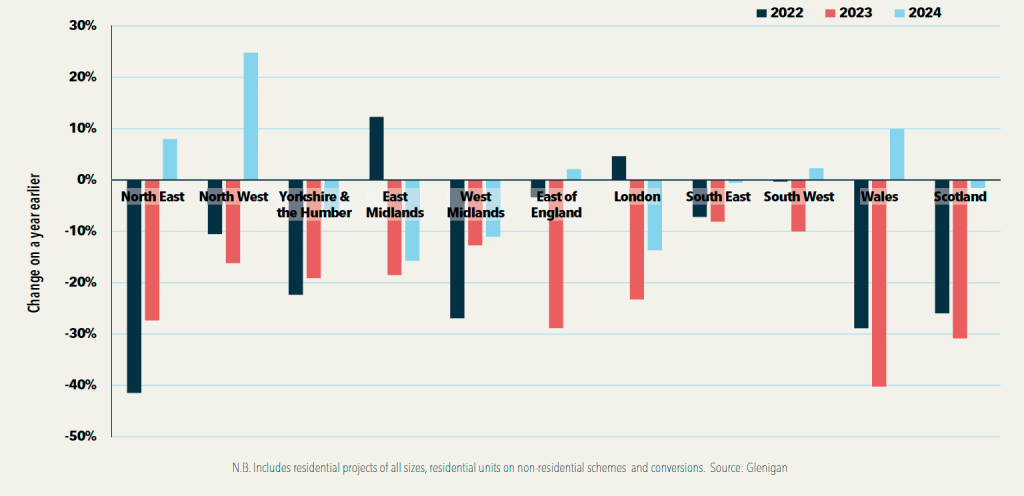UK’s construction industry is expected to grow in 2025, but rising input costs remain a challenge. So, what does this mean for self-builders?
In this article we cover:
- Rising costs – How inflation, wages and supply issues are affecting self-build budgets.
- Material price trends – Where costs are heading and how to plan for increases.
- Labour shortages – The impact of fewer skilled workers on project timelines and pricing.
- Industry trends – What’s happening in the construction sector and how it affects self-builders.
- Planning approvals – How fewer permissions granted in 2024 could shape the market.
- Managing costs in 2025 – Strategies to keep your self-build affordable despite rising prices.
- Should you wait? – Whether delaying your build will save or cost you more in the long run.
How affordable will it be to self-build in the UK in 2025?
If you’re planning to build your own home, you may be wondering if it’s affordable to self-build in the UK in 2025. Rising costs, labour shortages and economic uncertainty all play a role in shaping affordability — but self-build remains a viable option with careful planning.
Rising costs: What to expect
Building costs are set to rise by 17 per cent over the next five years, with tender prices increasing by 15 per cent, according to the latest Building Cost Information Service (BCIS) report.
While BCIS forecasts that construction output is expected to grow, 2025 may be a tough year, with minimal growth before an expected recovery later.
[adrotate banner="56"]Labour costs are a major factor, driven by National Insurance and National Living Wage increases. Employer costs will rise by 2.5 per cent in April, and overall labour costs could jump 18 per cent by 2030. A shortage of skilled workers — exacerbated by an ageing workforce and reduced immigration — may also push up prices.
On the materials front, costs have stabilised after sharp increases in recent years but are still forecast to rise by 15 per cent over the next few years.
Industry trends affecting self-builders
In January 2025, UK house building levels fell for the fourth month in a row, marking the sharpest decline since January 2024. That’s according to the BNP Paribas Real Estate Ireland Construction Purchasing Managers’ Index (PMI).
Supply chain issues remain a concern, “transport delays meant that vendor lead times lengthened to the greatest extent for two years,” says Tim Moore, Economics Director at S&P Global Market Intelligence which publishes the PMI.
Subcontractor rates increased at an accelerated pace in January, with the rate of inflation hitting a 21-month high.
Material costs as well as wages and salaries all increased in the fourth quarter of last year, according to the Federation of Master Builders (FMB) State of Trade Survey for the third quarter of 2024.
Around 64 per cent of all FMB members reported an increase in material costs and nearly 60 per cent a net increase in wages and salaries.
Almost seven in 10 builders said rising input costs led them to increase the price they charge for work.
Around three in four FMB members who were surveyed said they thought that the first quarter of 2025 would continue with further material cost rises, with more than half expecting further wage increases.
Job enquiries across the UK gradually declined in 2024, with a sharp drop of 23 per cent in Q4. Despite this, builders in Scotland and Wales saw increases, with enquiries rising by 19 per cent and 9 per cent respectively. Northern Ireland remained steady with no change. Meanwhile, England’s decline worsened, falling from -20 per cent in Q3 to -30 per cent in Q4.
The house renovations side remains “relatively stable” while home improvements experienced a “substantial drop” from 61 per cent in Q3 to 54 per cent in the final quarter of 2024.
Access to skilled labour continues to be a challenge in the industry, with almost half of FMB members reporting a shortage with knock-on effects such as having to cancel jobs.
Taking steps to address the construction skills crisis, in March, the government announced more than £600m of funding over the next four years to help train up to 60,000 more skilled construction workers – bricklayers, electricians and carpenters.
What this means for self-builders in 2025
How affordable it will be to self-build in the UK in 2025 will depend largely on how well you plan your budget and secure fixed-price contracts. Here’s what you need to consider:
Planning approvals: The number of new housing projects receiving planning permission fell 10% overall in Great Britain in 2024 (Housing Pipeline Report), which could lead to longer wait times and higher demand for planning consultants. However, Wales saw a 10% increase, highlighting regional differences.

Labour shortages: Finding skilled tradespeople may be more difficult, with nearly half of builders surveyed by FMB reporting project delays due to staff shortages. To mitigate this, secure your trades early.
Material costs: While stabilising, prices remain high. Some builders report slight decreases, but not enough to offset previous surges. Locking in supplier agreements now could prevent future price hikes
Is waiting for prices to drop a false economy?
Holding off on your build in the hope of lower costs could be risky. Most indicators suggest that prices are not likely to fall significantly — and delays may result in higher costs later.
Instead, self-builders can take strategic steps to manage affordability:
- Secure fixed-price contracts early to hedge against rising costs.
- Consider phased building to spread costs over time.
- Explore alternative materials and methods, such as off-site manufacturing or timber frame construction, which could reduce expenses.




